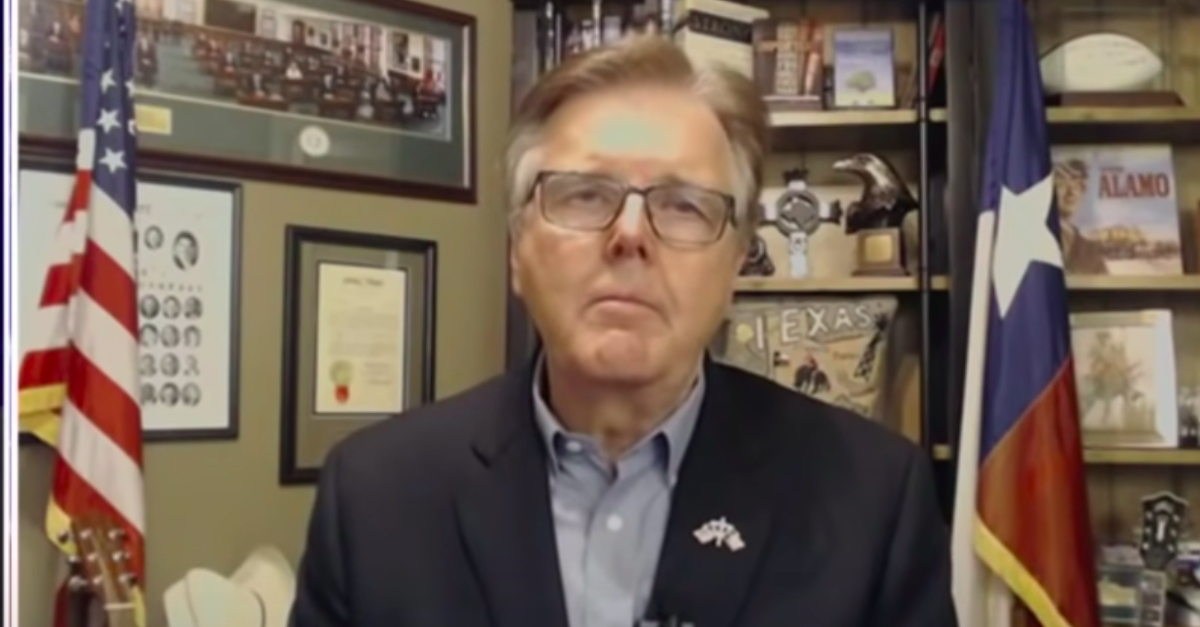
Texas Lt. Gov. Dan Patrick (R) on Wednesday declared his full-throated support for a law requiring the U.S. national anthem to be played at all events in the state which receive public funding. While the full text is not yet available, the measure—a response to outspoken Dallas Mavericks owner Mark Cuban announcing the team would no longer be playing the anthem—was quickly flagged by legal experts as a violation of the First Amendment.
In a statement, Patrick said passing the Star Spangled Banner Protection Act, designated as Senate Bill 4, would be a “legislative priority” in the state legislature.
“It is hard to believe this could happen in Texas, but Mark Cuban’s actions of yesterday made it clear that we must specify that in Texas we play the national anthem before all major events. In this time when so many things divide us, sports are one thing that bring us together — right, left, black, white and brown,” Patrick said. “This legislation already enjoys broad support. I am certain it will pass, and the Star Spangled Banner will not be threatened in the Lone Star State again.”
Following Cuban’s remarks, the NBA issued a statement directing all teams to continue playing the anthem before home games, saying it was “in keeping with longstanding league policy.”
But there is a significant distinction between such an anthem mandate being required by a private organization, such as the NBA, rather than being imposed by state actors.
The issue of state compelled speech has repeatedly been addressed by the U.S. Supreme Court, most recently in the 2013 case Agency for International Development v. Alliance for Open Society International. In a 6-2 decision penned by Chief Justice John Roberts, the court ruled that requiring private organizations vying for federal funding to adopt policies explicitly opposing prostitution was a violation of the First Amendment.
In an email to Law&Crime, Amy Kristin Sanders, an attorney and professor of media law at the University of Texas Austin School of Journalism, explained further.
“As a private organization, the NBA may legally require its teams to play the national anthem before games. Those teams cannot claim such an action violates their free expression rights. This is akin to the NFL saying that players could not take a knee in protest,” Sanders said. “Neither of these situations raises First Amendment issues because they involve private entities rather than the government. But Patrick’s proposal that the Texas Legislature pass a state law requiring the national anthem be played represents state action. As a part of its speech protections, the First Amendment also bars state actors from compelling others to speak – and requiring someone to play the national anthem is just that. Under our current jurisprudence, his proposal is clearly unconstitutional and would violate folks’ right to free speech.”
Other lawyers criticized Patrick’s coerced patriotism measure by pointing out the absurd scenarios that could end up being required under the law.
“I’m fine with this, if it means Texas’s Governor, Lt Governor, and Attorney General must play the Star Spangled Banner, in full, with their hand to their heart, whenever they enter a room or answer the phone. Those are also ‘events which receive public funding,’” wrote attorney Max Kennerly.
“ALL events which receive public funding?,” wrote Vox legal analyst Ian Millhiser. “So, like, if I give a book talk at the University of Texas, they gotta play the Star Spangled Banner? Professor teaches an intro to psychology class? Star Spangled Banner first. Frat party in a state-owned dorm? Star Spangled Banner.”
https://twitter.com/imillhiser/status/1359710319174684673?s=20
The state Democratic party wasn’t as amused.
“Patrick continues to yap and yap while Texans continue to get sick, lose their livelihoods, and die,” Abhi Rahman, the communications director for Texas Democrats, told the Austin American-Statesman. “That’s the Dan Patrick way.”
[image via Fox News screengrab]